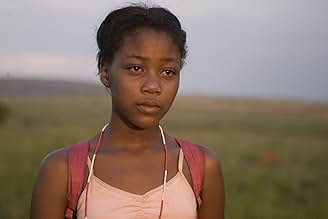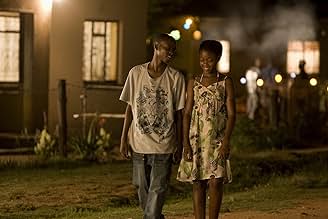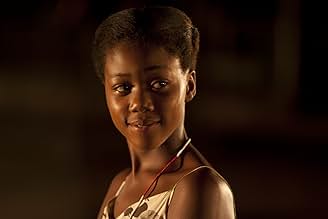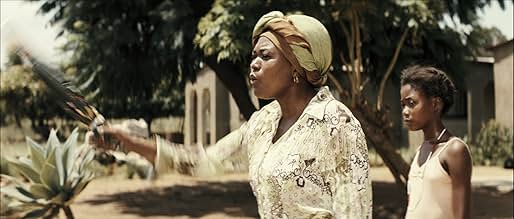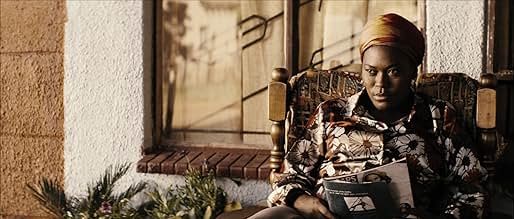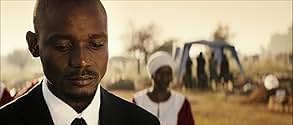VALUTAZIONE IMDb
7,1/10
1540
LA TUA VALUTAZIONE
Aggiungi una trama nella tua linguaA touching mother-daughter relationship that reflects the modern South Africa.A touching mother-daughter relationship that reflects the modern South Africa.A touching mother-daughter relationship that reflects the modern South Africa.
- Regia
- Sceneggiatura
- Star
- Premi
- 13 vittorie e 10 candidature totali
Harriet Lenabe
- Mrs. Tafa
- (as Harriet Manamela)
Recensioni in evidenza
Oliver Schmitz, the German director has a panache for telling socially relevant stories about South Africa. In the hey days of the apartheid years he made the classic and iconic Mapantsula which through its lead character Panic, a petty criminal, the international world was able to see how bad the system is through Panic's story of political consciousness been awaken by events happening around him. In the 90's he made a post apartheid film Hi-Jack stories;it did not fare that well but touched on lure of gangsterism, hijacking and criminal behavior in the new South Africa. It's very poignant in the post Madiba- post Mbeki years and in the year of the Zuma presidency that Schmitz tackles the thorny issue of the shame that is associated with HIV/AIDS and the burden of child headed families due to this epidemic. Although immediately one would like to associate Life,above all with Yesterday but Life above all is a cut above Yesterday .It feels more sincere, touching and less whimsical than Yesterday, although the films are both set in the rural areas, both use vernacular and deal with stigmatization. I think the choice to tell the story from the child's perspective in Life, Above All is refreshing and the film actually feels more contemporary than Yesterday.
The child in question here is Khomotso Manyaka who plays Chanda; the eldest daughter in her family who has to act as a glue to hold the film and the family together as they go through trying times. Half the cast of the film have not appeared in anything before, and some of the cast are none actors ,so the performances are not always strong but they are always heart felt. Khomotso does a lot of heavy lifting and one hopes her career does not start and end here but keeps growing; for she is able to emote well and gives Chanda that naivety and tenacity at all the right moments. Then there's the evergreen Lerato Mvelase as Chanda's mother Lilian; Lerato gives Lilian that grace that a mother would have, although at times I felt she was a bit too young to have a child of Chandas age but her performance is that great that one easily overlooks that conceit. Then there's Harriet Lanabe as Mrs.Tafa; who if there was any justice in this world would be getting local awards for her performance in this role. She's brilliant; she inhibits this woman's character so well that one cannot distinguish between the character and the actor. There are plenty of acting talent in this film The film benefits for having evenly structured multi-stories were all the major characters have their journeys and we get to follow them to the end.So its not just about the messaging but there is a story that one can immerse themselves in.The powerful thing about this story is that it keeps bringing you back to our own reality and makes one ponder about one or two things as you are watching it.
What I liked about Life, Above All is that it shows that shame factor actually does not help the situation. Shaming people and trying to put them down and ostracizing them does not sort the problem but just makes it bigger and this can be said not just for HIV/AIDS but for homosexuality,criminal behavior or any social or familial problem. It is through Chanda's uncompromising love that we see a way out of the virtuous cycle of shame and guilt.This movie ain't easy to watch but it's not a bleak movie at all. Shcmitz captures the tone of the rural life very well, from costume, to weather to iconography but above all he is able to capture the idea of a community. How communities work ,the good,the bad and the darn ugly of communities but above all what communities can do together to uplift and not just to tear down. Do yourself a favor and watch this one, it's a classic in the making, a story about us on the big screen catching it while its there.
The child in question here is Khomotso Manyaka who plays Chanda; the eldest daughter in her family who has to act as a glue to hold the film and the family together as they go through trying times. Half the cast of the film have not appeared in anything before, and some of the cast are none actors ,so the performances are not always strong but they are always heart felt. Khomotso does a lot of heavy lifting and one hopes her career does not start and end here but keeps growing; for she is able to emote well and gives Chanda that naivety and tenacity at all the right moments. Then there's the evergreen Lerato Mvelase as Chanda's mother Lilian; Lerato gives Lilian that grace that a mother would have, although at times I felt she was a bit too young to have a child of Chandas age but her performance is that great that one easily overlooks that conceit. Then there's Harriet Lanabe as Mrs.Tafa; who if there was any justice in this world would be getting local awards for her performance in this role. She's brilliant; she inhibits this woman's character so well that one cannot distinguish between the character and the actor. There are plenty of acting talent in this film The film benefits for having evenly structured multi-stories were all the major characters have their journeys and we get to follow them to the end.So its not just about the messaging but there is a story that one can immerse themselves in.The powerful thing about this story is that it keeps bringing you back to our own reality and makes one ponder about one or two things as you are watching it.
What I liked about Life, Above All is that it shows that shame factor actually does not help the situation. Shaming people and trying to put them down and ostracizing them does not sort the problem but just makes it bigger and this can be said not just for HIV/AIDS but for homosexuality,criminal behavior or any social or familial problem. It is through Chanda's uncompromising love that we see a way out of the virtuous cycle of shame and guilt.This movie ain't easy to watch but it's not a bleak movie at all. Shcmitz captures the tone of the rural life very well, from costume, to weather to iconography but above all he is able to capture the idea of a community. How communities work ,the good,the bad and the darn ugly of communities but above all what communities can do together to uplift and not just to tear down. Do yourself a favor and watch this one, it's a classic in the making, a story about us on the big screen catching it while its there.
(2011) Life, Above All/ Le secret de Chanda
(In South Africa with English subtitles)
DRAMA
At the first few minutes has 12 year old Chanda (Khomotso Manyaka) picking a coffin for her baby sister. We don't know how she had died, except to say that deaths over there are a common occurrence. She later finds out that her worthless step dad stole money so that he can drink more, intended for the coffin, forcing Chanda to go and take the money back. After burying her baby sister, the movie then dwells on Chanda having to take care of her mother without viewers understanding what she's diagnosed with, with critics I've read, saying that her mother's contacted the aids epidemic. As a result of her mother suffering of something created a rift within her neighbors eager to drive her away. In this movie, we also get to witness, rituals practiced if people can't afford medicine, treatment or proper health care. There's also zero criticism about how it's gov't treats it's own people. Many of the things shown on this movie are absolutely nothing new to anyone who keeps up with the news, since much of what's shown here are usually shown in documentaries and whatnot. Why watch the movie one may ask, it is to say that nothing's still being done about anything and that children should not have to carry this kind of responsibility when it's the governments job.
At the first few minutes has 12 year old Chanda (Khomotso Manyaka) picking a coffin for her baby sister. We don't know how she had died, except to say that deaths over there are a common occurrence. She later finds out that her worthless step dad stole money so that he can drink more, intended for the coffin, forcing Chanda to go and take the money back. After burying her baby sister, the movie then dwells on Chanda having to take care of her mother without viewers understanding what she's diagnosed with, with critics I've read, saying that her mother's contacted the aids epidemic. As a result of her mother suffering of something created a rift within her neighbors eager to drive her away. In this movie, we also get to witness, rituals practiced if people can't afford medicine, treatment or proper health care. There's also zero criticism about how it's gov't treats it's own people. Many of the things shown on this movie are absolutely nothing new to anyone who keeps up with the news, since much of what's shown here are usually shown in documentaries and whatnot. Why watch the movie one may ask, it is to say that nothing's still being done about anything and that children should not have to carry this kind of responsibility when it's the governments job.
This movie should be compulsory viewing for all budding film students. In fact all film makers, everywhere, should be locked in a small, locked room, strapped down and forced to watch this. For in the hour and a half it takes to watch this movie you will learn more about what movie making is truly all about. Here is a movie with a heart, a soul and perhaps most importantly, a point. It will rip your heart apart and along the way make you feel infinitely guilty that you have the couple of bucks to rent this movie, let alone enough money to own a television set to watch it on. Yet this is not the "message" this is simply a consequence of telling a real life story, of people with nothing and who just get on with life. It is indictment on the human race that we live in such inequitable times, yet again, that is not the message, just the backdrop. The actors in this movie are simply magnificent. Not only is the "lead" actor who plays Chanda stunningly good but also those who play small, almost minute parts. Amongst a truly outstanding cast the young girls who play 12 year old Esther and 6 year oldish Iris are simply phenomenal, these tiny children conveying more in a smile or the tiniest wrinkle of their faces than a veteran actor of 60 years. How they even understood what they had to do amazes me, how they actually did it astounds me.
This is a "simple" story but then again the best things in life are simple. This is a movie mostly about humanity, and sometimes about the lack of humanity. It is about personal strength, about love, about the triumph (at least in this case) of compassion over everything the world can throw at you. OK, 100,000 movies have already been made about this stuff, and 100,000 more are still to be made. But this one actually works. See it and be amazed.
This is a "simple" story but then again the best things in life are simple. This is a movie mostly about humanity, and sometimes about the lack of humanity. It is about personal strength, about love, about the triumph (at least in this case) of compassion over everything the world can throw at you. OK, 100,000 movies have already been made about this stuff, and 100,000 more are still to be made. But this one actually works. See it and be amazed.
The world celebrated the end of apartheid in South Africa in the early 1990s. Unfortunately, many of the problems created by the system of institutionalized racism persist to this day. "Le secret de Chanda" ("Life, Above All" in English) gives us an example. The movie reminded me of a book that my fifth grade class read about a pair of black South African children having to travel to Johannesburg during apartheid. Here we see the difficulties faced by the country's black population all these years after the racist laws got repealed.*
Spoken mostly in Northern Sotho and filmed mostly with a handheld camera, this movie tests your attention span. In my opinion, that's an extra incentive to see it. After all, how often do you get to see the day-to-day lives of people anywhere in Africa? It might not give you a full insight into the lives of most South Africans, but it's a start.
*In his autobiography "Born a Crime", Trevor Noah noted that the establishment of apartheid in 1948 merely codified what was already the status quo
Spoken mostly in Northern Sotho and filmed mostly with a handheld camera, this movie tests your attention span. In my opinion, that's an extra incentive to see it. After all, how often do you get to see the day-to-day lives of people anywhere in Africa? It might not give you a full insight into the lives of most South Africans, but it's a start.
*In his autobiography "Born a Crime", Trevor Noah noted that the establishment of apartheid in 1948 merely codified what was already the status quo
7OJT
I've been quite surprised if the quality of South African films from the latter years, and this is another example of this quality. And a South African film isn't only Dustrict 9 or Vehicle 19, which both were great, but also film like this little gem, based on the novel "Chanda's secrets" by Canadian Allan Stratton, and directed by the German director Oliver Schmitz, which is born in Cape Town, S.A.
Young Chanda, 12, is checking out the funeral for her little sister Sarah, which have suddenly died, getting to know that the money the mother kept has been stolen. Her father is an irresponsible drunk, and she realizes that her friend is selling services as a prostitute to the lorry drivers down town. Chanda begins to understand a lot about how the world functions. We get to see Chanda's poor neighborhood in Elandsdoorn outside of Johannesburg. Her mother turns ill just after, making even more challenges for Chanda, amongst them a lot of rumors and superstition. A superstition that adds deeply to the challenges in such a poor community.
The film was chosen for the "Un certain regard"-program under the Cannes Festival, very deservedly. I haven't read the novel, but I understand the film makes a good job, though having to let out some if the film to make a film out of it. Fine cinematography work, with great use of light focusing, and great job fond by the actors, makes this a very see-worthy film. It depicts the challenges which might occur in every society, but also the ones hitting especially hard in a poor neighborhood.
It's a beak realistically told film, even if it's a fictional tale. Still the film is not without hope. Chanda makes a big difference in her neighborhood, with her heart and sense of getting things right.
Young Chanda, 12, is checking out the funeral for her little sister Sarah, which have suddenly died, getting to know that the money the mother kept has been stolen. Her father is an irresponsible drunk, and she realizes that her friend is selling services as a prostitute to the lorry drivers down town. Chanda begins to understand a lot about how the world functions. We get to see Chanda's poor neighborhood in Elandsdoorn outside of Johannesburg. Her mother turns ill just after, making even more challenges for Chanda, amongst them a lot of rumors and superstition. A superstition that adds deeply to the challenges in such a poor community.
The film was chosen for the "Un certain regard"-program under the Cannes Festival, very deservedly. I haven't read the novel, but I understand the film makes a good job, though having to let out some if the film to make a film out of it. Fine cinematography work, with great use of light focusing, and great job fond by the actors, makes this a very see-worthy film. It depicts the challenges which might occur in every society, but also the ones hitting especially hard in a poor neighborhood.
It's a beak realistically told film, even if it's a fictional tale. Still the film is not without hope. Chanda makes a big difference in her neighborhood, with her heart and sense of getting things right.
Lo sapevi?
- QuizThe film was selected as the South African entry for the Best Foreign Language Film at the 83rd Academy Awards. It was not ultimately nominated but did make the Academy's shortlist.
- ConnessioniFeatured in Maltin on Movies: Harry Potter and the Deathly Hallows: Part 2 (2011)
I più visti
Accedi per valutare e creare un elenco di titoli salvati per ottenere consigli personalizzati
- How long is Life, Above All?Powered by Alexa
Dettagli
- Data di uscita
- Paesi di origine
- Sito ufficiale
- Lingua
- Celebre anche come
- Life, Above All
- Luoghi delle riprese
- Aziende produttrici
- Vedi altri crediti dell’azienda su IMDbPro
Botteghino
- Lordo Stati Uniti e Canada
- 134.461 USD
- Fine settimana di apertura Stati Uniti e Canada
- 13.788 USD
- 17 lug 2011
- Lordo in tutto il mondo
- 230.529 USD
- Tempo di esecuzione1 ora 40 minuti
- Colore
- Mix di suoni
- Proporzioni
- 2.35 : 1
Contribuisci a questa pagina
Suggerisci una modifica o aggiungi i contenuti mancanti

Divario superiore
By what name was Le secret de Chanda (2010) officially released in Canada in English?
Rispondi






